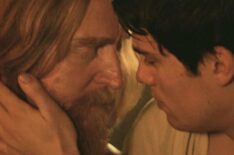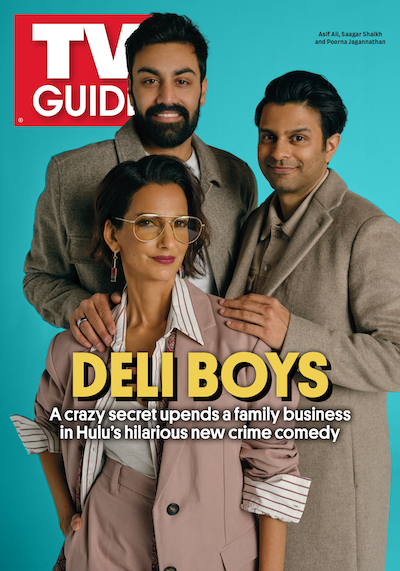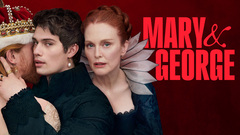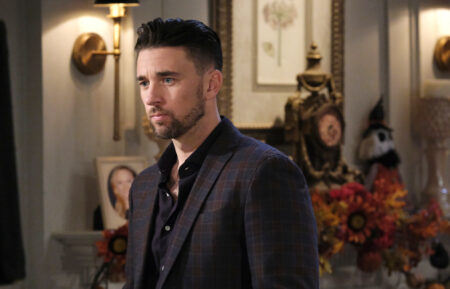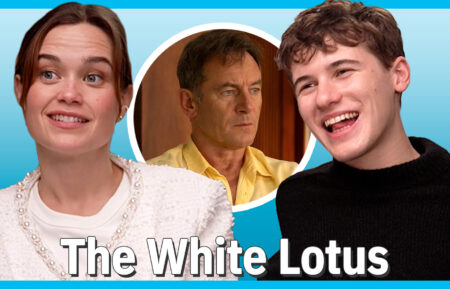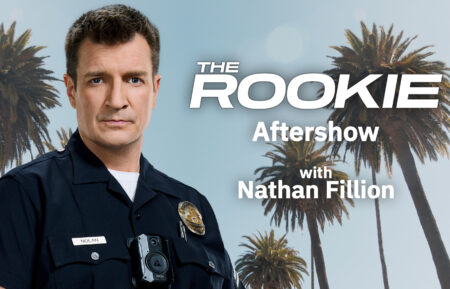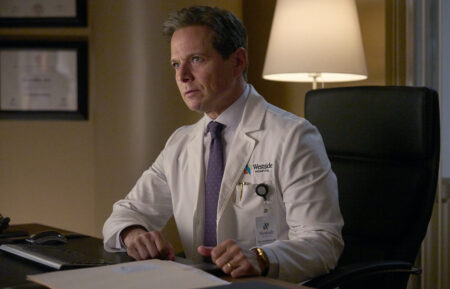‘Mary & George’ Finale: Nicholas Galitzine & Tony Curran Address ‘Intimate’ Deaths
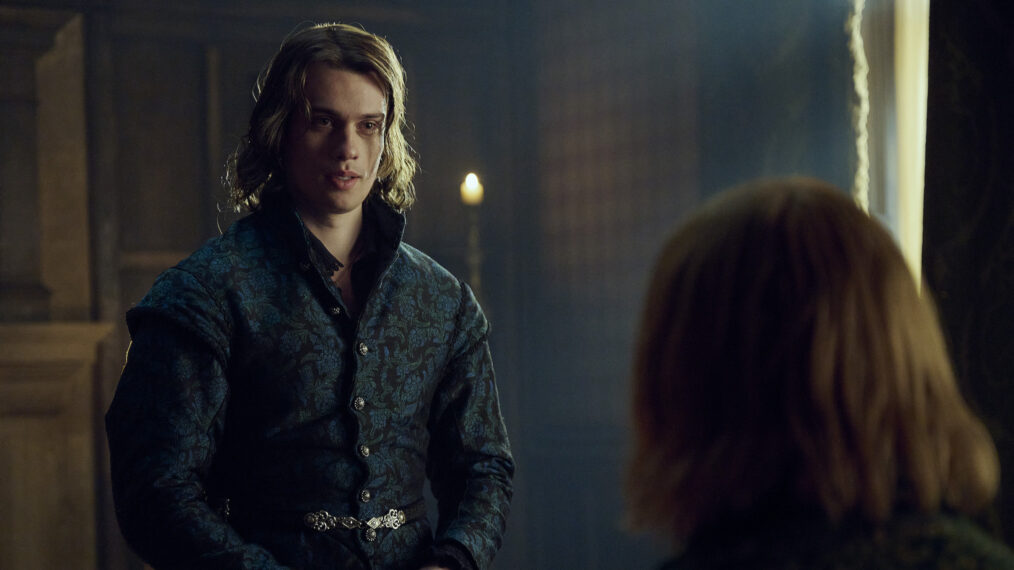
Spoiler Alert
[Warning: The following contains MAJOR spoilers for the Mary & George finale, “War.”]
Mary & George was always headed towards a deadly end. The excellent Starz period drama is based on Benjamin Woolley’s non-fiction book The King’s Assassin: The Fatal Affair of George Villiers and James I. The title alone should tell you everything you need to know. But even if you did know how Mary & George could end thanks to history, it didn’t make the violent conclusion any less tragic, and the creators took a creative liberty with how one character was killed that kept viewers on their toes.
The King’s Assassin explores the evidence that George Villiers, the Duke of Buckingham and longtime lover of the Scottish King James I (successor of Queen Elizabeth I), actually murdered the monarch instead of the king dying peacefully in his bed. Rumors immediately surrounded the largely disliked George saying that he poisoned the king and that his mother, Mary Villiers, was involved. Mary & George took things even further by having George (Nicholas Galitzine) suffocate James (Tony Curran) to death in their own bed while Mary (Julianne Moore) not only watched but convinced her son to do it.
Mary and George killed the king because he threatened their lives. He did so in the show’s operatic climax during which the romantic bedroom George built for James in the forest burned down. George’s failures in Spain and beyond made the king reach his limit. He had enough of being used by his lover, and knowing what he knew about the mother-son duo, James was determined to see them dead. Survival brought Mary and George back together after being deeply “soured” of each other (letting your mother’s lover be murdered “like an animal” didn’t necessarily foster closeness). Their reunion was lethal for James.
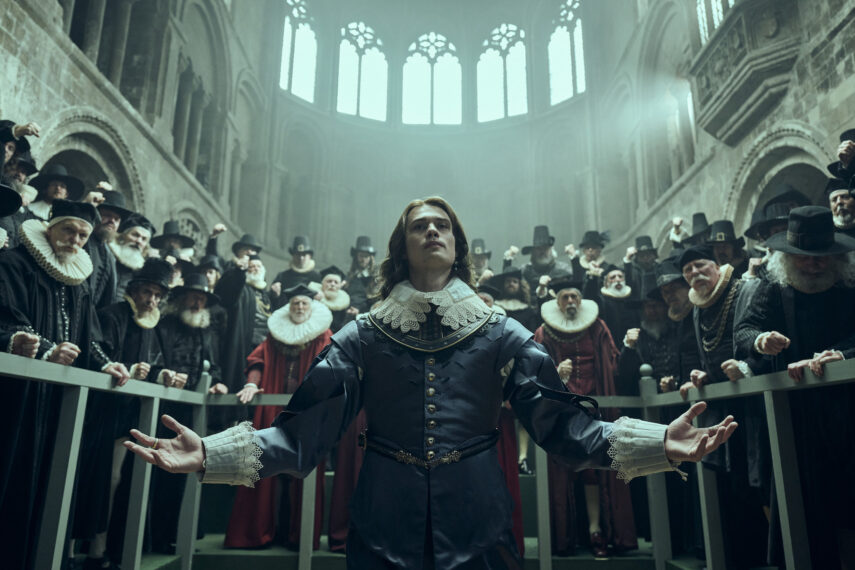
George is drunk on power in the Mary & George series finale (Starz)
George climbed on top of James in their bed and suffocated him until dead, but he used his own hands instead of a nearby pillow. Galitzine tells TV Insider that this was an intentional choice.
“Originally it was supposed to be suffocating with a pillow, and then we thought there’s just something not very visceral about that. We really wanted to see the exchange of betrayal and guilt and necessity between the two characters,” Galitzine says. He actually feared it wasn’t “intense enough” upon first watch but realized how “impactful” this murder was after hearing feedback from others on the team. Despite George’s hubris and ego in the final episode, killing James wasn’t something he did with ease, Galitzine says. “We have a huge amount of remorse in the small interaction with Mary beforehand, and then going into the main action point, it’s just pure necessity, it’s survival.”
“We go from that lovely scene in the brothel where George says, ‘I don’t want to hurt anyone ever,’ to him taking someone’s life,” Galitzine says of his character’s downward spiral. “We talked a lot about George and how he had killed parts off of himself.” Together with directors Florian Cossen and Alex Winckler, Galitzine “earmarked different scenes where George starts to lose parts of himself,” and killing James is “the final nail in the coffin,” the actor says. “People speculate at the authenticity and sincerity of their relationship, but we really do believe that there was a genuine love there, but [killing James is] survival at the end of the day.”
The most effective part of the scene is when Cossen had the camera show viewers the violent act from both James and George’s eye lines, giving us a direct look into the eyes of the killer and the killed, the lover and the betrayer. Curran tells TV Insider the key direction he received from Cossen in this scene.
As Curran recalls Cossen saying, he wanted him to “have something in your eyes of just like, ‘No, why? Why?’ And then letting go. You are almost glad it’s him who’s killing you, and just let go.” It’s a “beautiful” and “vicious” way to go, Curran says. Galitzine agrees that it’s a “perversely intimate” way to kill someone.
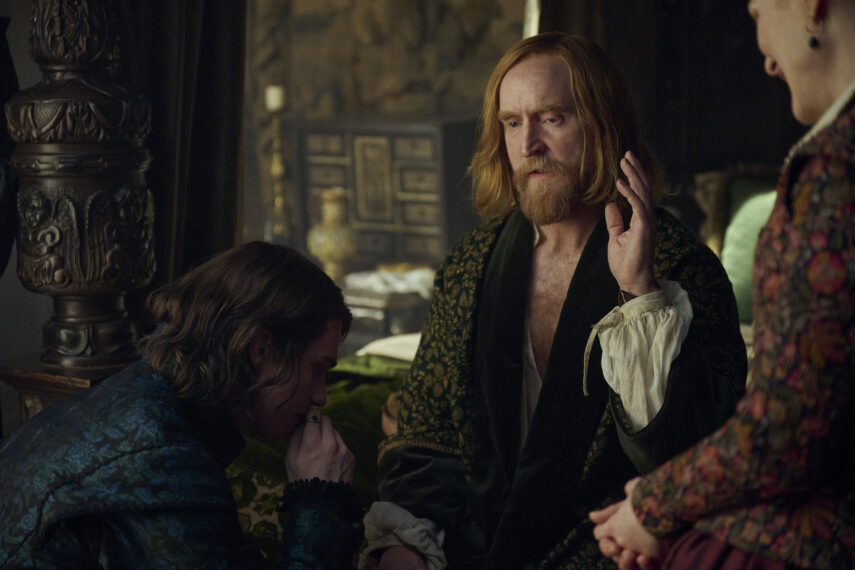
James has had enough of Mary and George in the Mary & George series finale (Starz)
“Killing someone like that with your hands ’round a throat, is there any other way that’s just like, ‘This is you and me, and I’m trying to end you right now,”‘ Curran asks. “Is there any more darker, more horrific way? And someone who you love in your own bed … It’s a very tragic story.”
James was in “denial” about how bad his relationship with George had gotten in this episode, Curran admits. “At that point, he’s letting go of power.” It’s in the scene in the forest bedroom with Mary when Curran believes James has reached the peak of his complacency. “I think he feels that after that meeting with Mary that all his fears have come to light. This boy has betrayed him.”
“I spoke with Nick about this. George’s character, his ego takes over, his power takes over, his hubris enlarged. That’s how power can corrupt people,” Curran goes on. The tender love both of them are capable of can’t possibly make it to the surface at this point, and so all they can bring to each other is death.
Galitzine and Curran filmed the POV death scene shots first, and then they filmed Julianne’s part in ordeal the next morning. “She hadn’t seen what we’d shot or how we did it, so the camera was there and it was me, he was on top of me, and it was her reaction. We didn’t rehearse it. We just shot it. Her performance was a bit in shock as well,” Curran says with a laugh. Faking dead is a physically uncomfortable experience, especially when you have “Nick Galitzine, big strong boy” sitting on you, the Scottish actor teases, adding with a laugh, “They’re getting coverage on Mary, but I was like, ‘Please say cut.'”
Julianne was shook by how good the performance was. After Julianne finally said cut, “I looked at her and her face was ashen, and I said, ‘Julia, are you OK?’ And she went, ‘Am I OK? Are you OK?!” Curran recalls.
Mary is the only one to come out on top in the series. Just like history, George is murdered a few years after James’ death, but his death happens not with a bang but with a whimper. George is stabbed in the gut by a rival he can hardly remember in the middle of a pub, and he’s so blind to reality that he’s hitting on his soon-to-be assassin in his final moments. It’s a “tragic” end because of how meaningless it is, Galitzine says.
There’s also tragedy in the final shot of the series, seen below. The camera zooms in slowly on Mary, who’s looking the richest she ever has, surrounded by her children and grandchildren. There’s an empty seat left for George at the table right next to his wife and son.
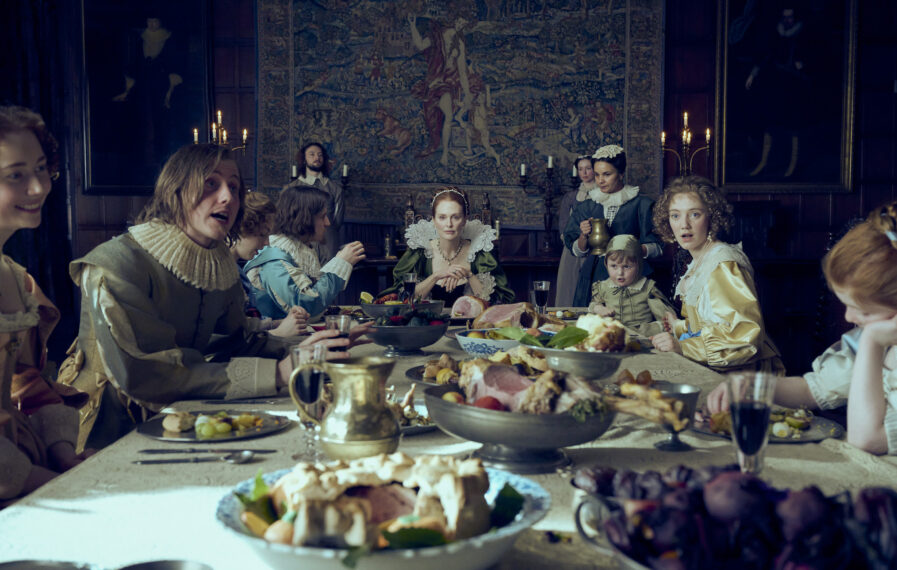
Mary Villiers sits at her table surrounded by family, an empty seat left open for the late George, in the Mary & George series finale (Starz)
“The wonderful thing about that sort of tragic final shot of the show is that these two have been confidants and they can’t really exist without one another,” Galitzine says. George “tries to find a rationale out of” killing James, but Mary says she “saw no doubt” in James’ desire to have them both killed. “Without his mom pushing him as she always has,” he explains, George may have been better off. He started the series so “loving” and “innocent,” and then he’s dead in the end in part because of how his mother molded him.
Executive producers D.C. Moore and Liza Marshall tell TV Insider that they knew they wanted Mary to look directly into camera only once in the series, and they toyed around with a couple of options, but eventually they knew that the look had to be the final shot. It’s quite effective. She’s dripping in pearls, which have served as a symbol of growing wealth throughout the series through George’s pearl earring.
Mary is wearing a similar earring in the final frame, except hers has two pearls dripping down — one to represent George and James, it seems. Given all the death surrounding her, paired with a pained but satisfying look on her face before the series cuts to black, the pearls feel like a kill list. Moore and Marshall tell us why they made this the final scene.
“I do think a slightly more boring show would’ve just had captions come up and explain her legacy and all the rest of it,” Moore (no relation to Julianne) says. “But we pretty early on decided we didn’t want to be that show. We didn’t want to be Wikipedia. We wanted you to feel that and experience it rather than just be told it.”
Mary & George took years to get created, and it took years to decide how their George would kill their James. “We talked about it obviously extensively and for years, what the ending would be,” Marshall says, “It’s the passion” that makes it so good and so awful. “It’s that he loves the king really, but he’s got no choice otherwise he’s going to be put to death.”
Moore says they initially considered making multiple seasons, but being a limited series meant they could get actors like Julianne who otherwise couldn’t commit to filming more than one season of television. Galitzine is grateful this wasn’t a movie, because “a lot of the time you don’t get that amount of bandwidth in a film to be able to really explore.” Having the seven-episode series culminate in this final shot of Mary is the “pregnant pause of death and then possibility” they wanted, Moore explains.
When Mary learns of George’s death, she doesn’t weep. She’s not even surprised. You almost think she had a hand in his downfall. Did she? “I wouldn’t go so far as to say she wanted it to happen, but for a long time before and knew it was going to happen,” Moore explains. “It’s one of the reasons she tried to pull him back from the brink.”
“She’s not dead-hearted, but she is hardhearted,” Moore continues, “and she understands if you continue this path — that path where you’re just pursuing power for its own sake, there’s nothing else to balance you and you haven’t got anyone advising you — it’s going to end in, as it always does in history, a bloody way.”
Mary was the ultimate schemer, and even in death secured a higher rise. “In the reality, she’s buried in Westminster Abbey in this extraordinary tomb that says she’s descended from five kings around the base of the tomb, which is patently untrue,” Marshall says. “But she certainly in death, it is in Westminster Abbey, which is the biggest cathedral in London, and she has this [tomb].”
“At that time in that period, legacy and establishing your family was the most important thing that you could do,” Marshall adds about Mary’s reaction to George’s death. “She succeeded in all her aims. For me, I imagine she was upset. There’s that brilliant moment where she says, ‘You are my son’ when he says, ‘Wouldn’t it be easier if I just died?’ And of course, she’s a mother, of course she loves her son, but it’s a complicated, dark cutthroat world at the same time.”
A cutthroat world that only Mary was cunning enough to survive.
Mary & George, All episodes available now, Starz App
From TV Guide Magazine
Crime, Comedy & Convenience Stores: Unwrapping Hulu's 'Deli Boys' With the Cast
Cupcakes, corndogs…and cocaine?! Two brothers find themselves in a hilarious pickle when they inherit an unseemly bodega biz in Hulu’s new comedy Deli Boys. Find out how The Sopranos and Real Housewives of Orange County influenced the cast. Read the story now on TV Insider.

